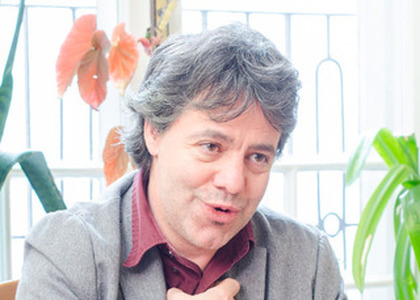> Interviews

Interview with the director of the Liszt Institute, Kósa András László
Mr Kósa András László, the 18th edition of the Hungarian Music Festival has just come to an end. The event was opened by an organ concert at the Italian Church, followed by a Hungarian music competition for young musicians. How would you describe the atmosphere of this year's edition?
We returned with the Hungarian Music Festival with the audience present at the event, because in the last two years we have organized this event without an audience, given the pandemic restrictions, and we even had a "zero" day of the festival, when we started with a unique concert in the 18-year history of the festival, with an organ concert at the Italian Church. After that, on Monday, Tuesday and Wednesday, the competition days took place with 20 competitors. I have to make a small correction... not only with music from Hungarian composers; the contestants having to have a third of the program pieces from the Hungarian musical literature. The three days were very successful. The jury had a rather difficult task to make the decision of the winners, and on Thursday evening there was the awards gala, where we had a concert of a duo of saxophone and piano coming from Hungary. After the small recital, the presentation of the awards followed. Those who come to the festival already know; we do not have cash prizes, we have prizes in gala concerts organized by our institutes in Europe. So, the winners will go to Paris, Rome and Budapest for a gala concert, a prize-winning concert.
The third prize was taken by the pianist Teodor Dumitru, who will go to the Academy of Music in Budapest; he will have a concert there. He also had in the program, among others, two pieces from Bartók Bela and Ligeti György - two Hungarian composers.
The second prize was also taken by a pianist, Andra Bacila, for her performance of the Dante Sonata by Liszt Franz and an Opus from Chopin. She will go to the Liszt Institute, the Hungarian Cultural Center in Paris this fall, for a gala concert.
The first prize was taken by the duo consisting of baritone Andrei Marinache and pianist Cristina Garbea. They will go to the College Hungaricum in Rome, Italy. They received the first prize for their performance in Hungarian musical literature of a play by Liszt Ferenc and one by Erkel Ferenc.
We have had several awards to offer from our partners. We have as a partner for several years the Summer University organized by ICon Arts, near Sibiu. The founder of this event, Sebastian Gheorghiu, came to the Institute and, after the jury's decision, a whole scholarship was received by the flutist Lázár Katica. This scholarship means two weeks of master classes, accommodation and meals at the ICon Arts Summer Academy.
We have, of course, as every year, the Audience Award. The public also decided this year that this award should go to the pianist Emanuela Ionita. She will have the opportunity to have a recital before Christmas - in fact, the last event of the calendar year at the Hungarian Cultural Center in Bucharest.
And we have another award that we give together with the ACCUM Foundation, led by Verona Maier, vice-rector at UNMB. This award is called "In memoriam Ludovic Bács". Ludovic Bács was for years a member of the jury and mentor of the Hungarian Music Festival. The "In memoriam Ludovic Bács" award was received by ex aeqvo cellist Dávid-Kacsó Soma and soprano Biro Anda. They will have the opportunity to have a concert at our Institute, organized in January next year, when we will organize a recital in memoriam Ludovic Bács around his birthday, January 19th.
On Thursday evening, the Institute's concert hall was small - already a few failed to enter the hall and listened to the gala concerts right in the lobby of the Institute. So, it means that the Institute has had a real success among the music lovers in Bucharest.
Looking back at the last 18 years, how has the Hungarian Music Festival evolved and what plans do you have for future editions?
What I must say, I confess, as a success of the festival, is that not only well-known composers such as Liszt, Bartók, Kodály are present in the repertoire of the contestants. In recent years, some composers or pieces from Hungarian music literature less known outside the borders of Hungary or to the public have already arrived. I can say that this year we also had Petrovics Emil or Dohnanyi Ernő, we had songs from Kocsá Pankratz, we had, of course, Kurtág György or Ligeti György, which I have already mentioned. This is very important because we try to promote Hungarian musical literature in Romania within the public and beyond. For us, it is very important for these composers to be known by musicians from Romania, to reach the musical universities in Romania and I think we have managed quite well in the last 18 years.
Secondly, it is very important for us to participate not only musicians from Bucharest, but to come from other cities. We can say already that from Cluj or Timisoara, from Brasov there are always competitors who come to this festival. Of course, we would also expect competitors from Iasi,Craiova, Constanta. I think we should work a bit more, present this festival at the music academies, the music universities in Iasi, Craiova and so on. We try to do this also during the chamber concerts that we organize every month here, at the institute, and where we try to bring young musicians from the country who can have a concert in Bucharest, in a very beautiful hall in the heart of Bucharest.
Translated by Beatrice-Andreea Porumb,
University of Bucharest, Faculty of Foreign Languages and Literatures, MTTLC, year I
Corrected by Silvia Petrescu














